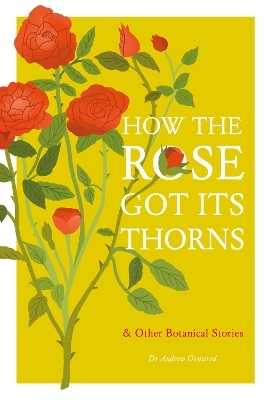
How the Rose Got Its Thorns
And Other Botanical Stories
Seiten
2024
Greenfinch (Verlag)
978-1-5294-3055-4 (ISBN)
Greenfinch (Verlag)
978-1-5294-3055-4 (ISBN)
Intriguing and stunningly illustrated, this book offers readers a fascinating glimpse into how our plants have evolved myriad successful strategies for survival.
Have you ever wondered why the rose has thorns and other flowers don't; why the daffodil is the colour it is; or why some plants have shiny leaves and others matt?
How The Rose Got its Thorns reveals the inner workings of our favourite flowers and trees. Designed to help gardeners, both novice and experienced, better understand how plants grow, the book is easy to navigate - it is divided into 50 chapters, each one a story.
Accompanied by specially commissioned colour illustrations, each chapter explains the science behind how plants work and the extraordinary processes they have evolved: such as protecting themselves from predators using chemicals; attracting pollinators using scent, shape and colour; growing in low or high temperatures; their relationship with the wind; the size and pattern of their leaves; the distribution of their seeds and survival strategies; their relationship with insects; how they allocate their resources; and how they retain water efficiently.
This delightful and intriguing book offers readers an accessible way to better understand how our plants evolved into the species of today.
Have you ever wondered why the rose has thorns and other flowers don't; why the daffodil is the colour it is; or why some plants have shiny leaves and others matt?
How The Rose Got its Thorns reveals the inner workings of our favourite flowers and trees. Designed to help gardeners, both novice and experienced, better understand how plants grow, the book is easy to navigate - it is divided into 50 chapters, each one a story.
Accompanied by specially commissioned colour illustrations, each chapter explains the science behind how plants work and the extraordinary processes they have evolved: such as protecting themselves from predators using chemicals; attracting pollinators using scent, shape and colour; growing in low or high temperatures; their relationship with the wind; the size and pattern of their leaves; the distribution of their seeds and survival strategies; their relationship with insects; how they allocate their resources; and how they retain water efficiently.
This delightful and intriguing book offers readers an accessible way to better understand how our plants evolved into the species of today.
Dr Andrew Ormerod is a botanist who holds an honours degree in Agricultural Botany and a doctorate in Plant Breeding. He has held positions at Reading University and Unilever Research and is Honorary Research Fellow at the University of Kent. He worked at the Eden Project for 15 years, from when it first opened in 1998, and where he was involved in plant procurement for the exhibits. He regularly lectures, gives tours and is the author of the successful plant blog, Cornucopiaalchemy.
| Erscheinungsdatum | 20.03.2024 |
|---|---|
| Zusatzinfo | Approximately 80 colour illustrations |
| Sprache | englisch |
| Maße | 162 x 238 mm |
| Gewicht | 668 g |
| Themenwelt | Sachbuch/Ratgeber ► Natur / Technik ► Garten |
| Sachbuch/Ratgeber ► Natur / Technik ► Natur / Ökologie | |
| Naturwissenschaften ► Biologie ► Botanik | |
| ISBN-10 | 1-5294-3055-0 / 1529430550 |
| ISBN-13 | 978-1-5294-3055-4 / 9781529430554 |
| Zustand | Neuware |
| Haben Sie eine Frage zum Produkt? |
Mehr entdecken
aus dem Bereich
aus dem Bereich
Obst- und Ziergehölze, Stauden, Kübel- und Zimmerpflanzen richtig …
Buch | Hardcover (2023)
Gräfe und Unzer (Verlag)
34,00 €
Buch | Hardcover (2023)
Bassermann (Verlag)
19,99 €


